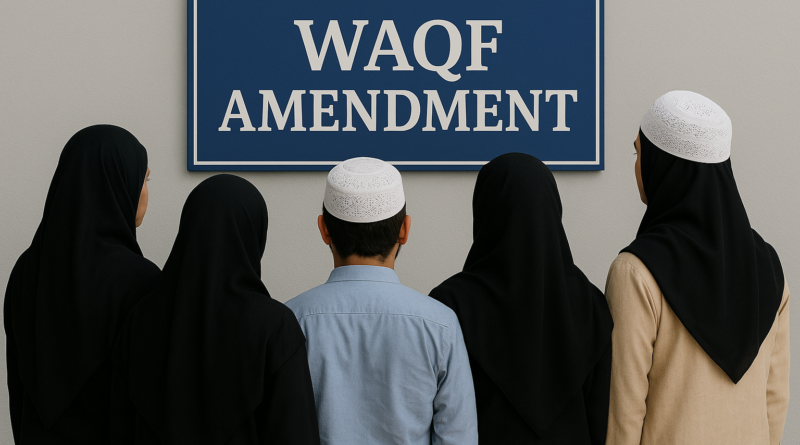The Waqf Amendment Bill 2025: Ushering in an Era of Transparency and Empowerment
The Waqf Amendment Bill 2025, recently passed by the Parliament, marks a significant step towards modernizing the management and administration of Waqf properties in India. This legislation aims to address long-standing issues of transparency, accountability, and efficiency that have plagued the Waqf system. By introducing crucial amendments to the existing Waqf Act of 1995, the bill seeks to safeguard Waqf assets, empower marginalized communities, and ensure that these properties are utilized for their intended charitable and religious purposes.
Understanding Waqf
A Waqf is an irrevocable dedication of movable or immovable property for religious, pious, or charitable purposes as recognized by Muslim law. These properties hold immense socio-economic significance, with the potential to contribute significantly to the welfare of the community, particularly the underprivileged. However, over the years, the management of Waqf properties has faced challenges such as encroachment, mismanagement, and a lack of transparency, hindering their optimal utilization.
Key Objectives and Advantages of the Waqf Amendment Bill 2025
The Waqf Amendment Bill 2025 brings forth several key changes aimed at improving the Waqf ecosystem. Some of the major advantages of this bill include:
- Enhanced Transparency through Digitalization: The bill mandates the creation of a centralized digital portal for the registration and management of all Waqf properties. This will ensure better record-keeping, monitoring, and prevent fraudulent activities. All property details will be accessible, promoting transparency and accountability in Waqf administration.
- Strengthened Governance and Management: The legislation streamlines the functioning of Waqf Boards by simplifying decision-making processes and enhancing coordination with local authorities. Regular surveys and updates of property records will be mandatory. Furthermore, transparent financial reporting and regular audits will be enforced to prevent mismanagement of funds.
- Protection of Waqf Properties: The bill introduces stricter penalties for the encroachment, illegal transfer, or sale of Waqf properties. It also empowers Waqf Boards to take more effective measures to protect these assets and resolve long-pending disputes, including those involving government or non-Muslim properties claimed as Waqf.
- Empowerment of Muslim Women: Recognizing the historical marginalization of women in Waqf affairs, the amendment bill ensures better representation of women on Waqf Boards. It also focuses on safeguarding the economic and legal rights of Muslim women, especially widows and divorcees, by addressing inheritance disputes and providing legal aid. Specific welfare initiatives, such as scholarships for girls, healthcare and maternity support, skill development programs, and pension schemes for widows, are emphasized.
- Inclusivity and Representation: The bill promotes inclusivity by ensuring fair representation of different Muslim sects, including Shia and Sunni, as well as representation from backward Muslim classes and local bodies on Waqf Boards. Notably, it also introduces provisions for the inclusion of non-Muslim members (excluding ex-officio members) to bring diverse perspectives to the management process.
- Support for the Poor and Marginalized: The historical role of Waqf properties in serving the underprivileged is reinforced in the amended bill. By preventing misuse and illegal occupation of Waqf lands, the legislation aims to boost revenue for Waqf Boards, enabling them to expand welfare programs in areas such as education, healthcare, housing, and livelihood support for the economically weaker sections of society.
- Focus on Dispute Resolution: The bill includes measures for the faster resolution of disputes related to Waqf properties. It also introduces an appeal mechanism to the High Court against the decisions of Waqf Tribunals, addressing previous limitations on judicial review.
- Separation of Trusts and Waqfs: The legislation clarifies the distinction between trusts created by Muslims and Waqfs, ensuring that trusts governed by other statutory provisions related to public charities do not fall under Waqf regulations.
- Protection of Inheritance Rights: The bill explicitly states that the inheritance rights of women and children must be secured before any property is declared as Waqf, providing special safeguards for widows, divorced women, and orphans.
- Scrutiny of Government Properties Claimed as Waqf: To ensure transparency and prevent unwarranted claims, the bill mandates that any government land or property claimed as Waqf will be investigated by an officer of a higher rank than a collector.
- Financial Flexibility: The bill reduces the mandatory contribution of Waqf institutions to Waqf Boards from 7% to 5%, allowing them to allocate more funds directly towards charitable activities.
Conclusion
The Waqf Amendment Bill 2025 represents a progressive step towards reforming the administration of Waqf properties in India. By prioritizing transparency, accountability, inclusivity, and the empowerment of marginalized groups, this legislation has the potential to unlock the vast socio-economic potential of Waqf assets. Effective implementation of these amendments will be crucial in ensuring that Waqf properties are managed efficiently and utilized to their fullest capacity for the benefit of the community, upholding the true spirit of Waqf.




